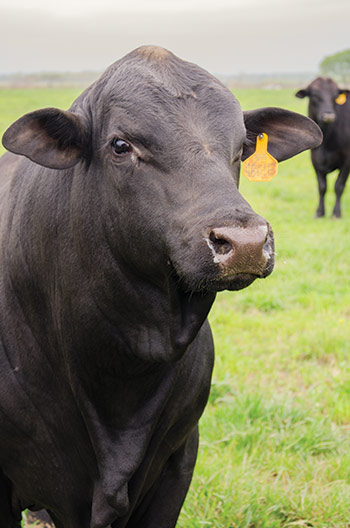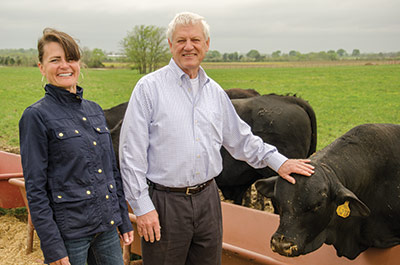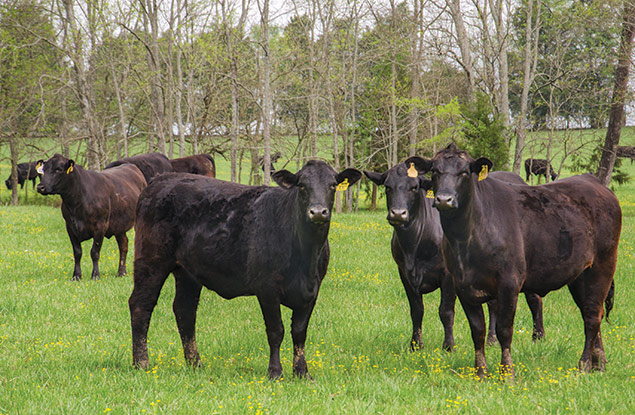
Photos by Sheryl Smith-Rodgers
Deep in conversation with visitors to his Mississippi farm, Milton Sundbeck leans up against a feed trough, ignoring an approaching storm and the curious stares coming from a group of prized bulls.
Suddenly, a wet nose nuzzles his arm. The friendly nudge comes not from an eager puppy, but rather from one of several Brangus bulls lined up at the trough. He chuckles and rubs the animal’s broad black forehead.
“See how docile he is? We breed our bulls to be this way,” Sundbeck says, as the bull continues to nudge his arm. “You want them to be gentle enough so they are safe to handle.”
Sundbeck, who owns both a chemical company and a registered cattle operation, knows his bulls. Since 2005, he and his team at Town Creek Farm near West Point have sought to produce rugged, top-quality Brangus bulls for commercial operations. “There’s a real need right now for Brangus seedstock, and we’ve got the proven genetics that cattlemen want,” he says during a recent farm tour. “We breed forage-based cattle with high fertility that are tough enough to live on the range.”
Lifelong Interest
Cattle and farming run deep in Sundbeck’s family. In 1915, his grandfather emigrated from Sweden and settled east of Austin, Texas, where he started a dairy farm. Growing up, Sundbeck worked on the family dairy farm as well as on the Hereford ranch that his other grandfather, Lynn White, owned near Clifton, Texas. When the farm was sold, his father landed a job at Jefferson Chemical Company in Austin. As a teenager, Sundbeck worked summers at the company, and then became a research assistant while studying chemistry at the University of Texas in Austin. This early experience in the chemical industry would influence an important decision for him.
“I’d watched all my relatives nearly starve in the farming and ranching business, so I realized I had to go into something else,” says Sundbeck, who went to work in 1968 at Hercules Incorporated in Houston, a leading manufacturer of paper and water-treating chemicals. “But I always dreamed that someday I would be able to buy a big enough place to raise my own cattle.”
For more than 15 years, Sundbeck rose through the ranks at Hercules and then American Cyanamid Company. While working in Mobile, Ala., managing the water treatment and paper chemicals business for American Cyanamid, he found an opportunity to start his own chemical manufacturing business. In 1980, he launched Southern Ionics Inc. in Mobile and later moved the firm to West Point, Miss.

Milton Sundbeck, right with Town Creek Farm's Marketing Manager Joy Reznicek
Realizing His Dream
Finally, in 1993, Sundbeck’s dream of farming came true when he purchased 800 acres of farmland east of West Point and several hundred stocker calves. Additional parcels totaling 2,000 acres were financed by the Mississippi Land Bank. “I focused on steers at first,” Sundbeck says. “I grew them out to 650 and 700 pounds, then sold them. But I really like mama cows best. So in 2005, I got into the registered Brangus business.”
About the same time, he met the late Joe Reznicek, who had developed the Ultrablack trademarked breed — Brangus crossed with Angus. Reznicek, owner of the Cow Creek Ranch in Alabama, also was known for producing forage-based Brangus genetics, which appealed to Sundbeck.
“Joe asked me how I was going to market my bulls, and I said I hadn’t thought about it,” Sundbeck recalls. “We talked some more, and I decided I’d join him as a joint-venture partner. That entailed buying his cows and genetics. Then he’d take my weaned bulls and put them into his development program.”
Sadly, lymphoma cut Reznicek’s life short in 2010. Before passing, he and his wife, Joy, planned for Cow Creek’s future without him. They decided to sell the entire cow herd to the Southern Cattle Company in Florida. Two years later, the company put the Cow Creek cattle up for sale.
“It was perfect timing for us to step in,” Sundbeck says. “We bought a large number of Cow Creek cows, and Joy came on board as marketing manager for our bull program.”
Stewardship
Town Creek Farm lies within the fertile Black Belt region that was once heavily farmed. Two miles of Town Creek, a tributary of the Tombigbee River, runs through the farm. Since the 1800s, row cropping had badly eroded the land and damaged the creek’s water quality. Right away, Sundbeck converted the land into grazing pastures and wildlife habitats. He fenced off stream banks from cattle and planted native trees and grasses as a buffer.
“I knew grazing was the best way to utilize this land,” he says. “Hay grows well here, so we grow our own, which saves a lot of money. Instead of corn, we produce and feed a forage-based ration that consists of ground hay, dry distiller’s grain, soy hull pellets and molasses.”
Not only a strong land steward, Sundbeck also cares deeply about the well-being of his animals — so much, in fact, that he incorporated humane handling systems into his new cattle-working facility. Features such as round crowd pens, curved chutes and grooved non-slip flooring were designed by Dr. Temple Grandin, a Colorado State University professor known for her work in animal welfare and behavior.
“Moving the cattle in a curve all at one time gives them a sense of returning,” Sundbeck notes. “Their natural behavior makes them want to go back where they came from. This design is safer for the cattle and the men who are working them. In this facility, we also freeze-brand using acetone and alcohol frozen to minus 87 degrees. The solution kills the hide’s color pigments so the hair grows back out white.”

Global Marketing
This fall, on Oct. 19, Town Creek Farm will host its first live video auction in a new sales facility that overlooks the farm’s gently rolling pastures. On sale day, prospective buyers will be able to view registered Brangus and Ultrablack bulls and commercial bred heifers in outdoor pens. An online catalog will enable long-distance buyers to watch the cattle on video. Inside the facility, giant flat-screen televisions will post videos of cattle while the auctioneer conducts sales that will simultaneously broadcast live via the Internet.
“No more sale rings,” Sundbeck says, explaining why the animals will not be paraded through the auction barn. “Video auctions are much less stressful on cattle and a lot safer for people running the sale.”
The huge sales facility — financed by the Mississippi Land Bank — accommodates 1,000 people and includes a commercial kitchen and dining tables. Easy access to airports and highways is an added convenience.
“This facility will boost [the economy of] the entire Golden Triangle region that’s bounded by Columbus, Starkville and West Point,” says David Loftin, vice president of operations at the Land Bank. “People will drive or fly in for sales, eat at local restaurants and stay in local motels.”
Internationally, Joy Reznicek markets Town Creek Farm semen and embryos to clients in Australia and South America. “A son of our herd sire Integrity 355S4 was recently a grand champion bull in Paraguay,” she says. “A South American bull from our genetics program was the national grand champion bull in Brazil.”
Sundbeck couldn’t be happier.
“South Americans love this style of cattle, which are moderate-framed and forage-based,” he says. “Knowing that my cattle can make it all over the world gives me a really good feeling.”
For more information, go to www.towncreekfarm.com.
-Sheryl Smith-Rodgers
The Story of Ultrablacks
Cow Creek Ranch began breeding Ultrablack cattle (Brangus crossbred to Angus) in 1993 and began actively marketing them in 1996. Cow Creek Ranch trademarked the Ultrablack name in 1998 and sold the trademark to the International Brangus Breeders Association (IBBA) in 2005.
Ultrablack females are defined as Angus-Brangus crossbreds and black in color. They are either 1/8 Angus and 7/8 Brangus, or 7/8 Angus and 1/8 Brangus.
In March 2013, the IBBA amended its bylaws allowing IBBA members to breed up to Brangus, using three crosses with Ultrablacks to produce purebred Brangus cattle eligible for registration. Offspring of the first cross Ultrablacks (Angus x Brangus) mated back to Brangus (Ultrablack x Brangus) are genetically 3/4 Brangus. When these individuals are mated back to Brangus (3/4 Brangus x Brangus), their calves will be 7/8 Brangus and considered purebred Brangus.”